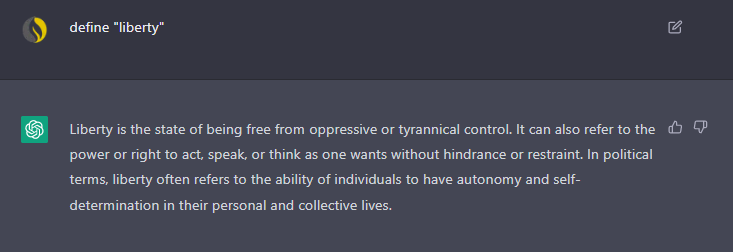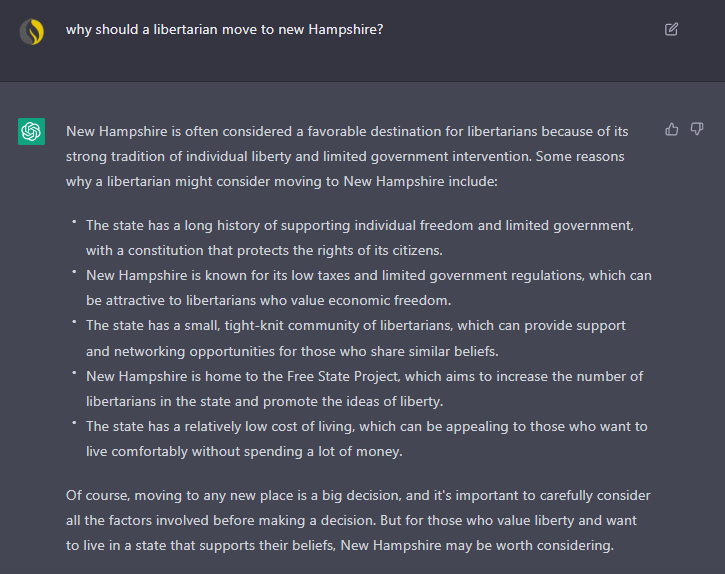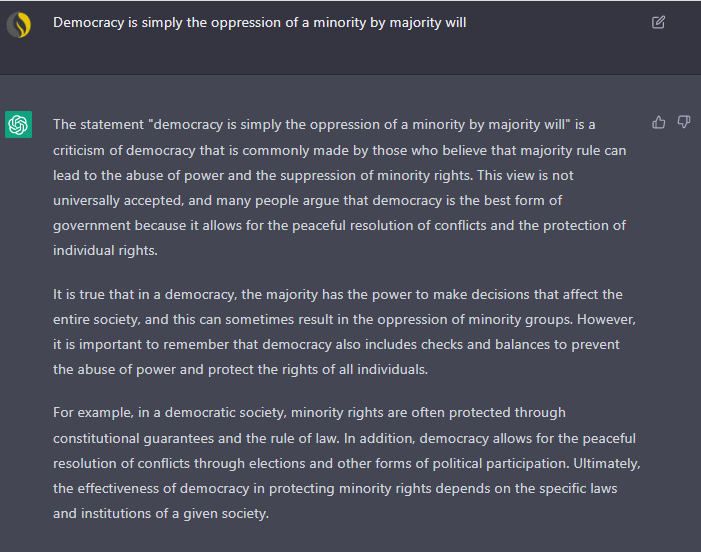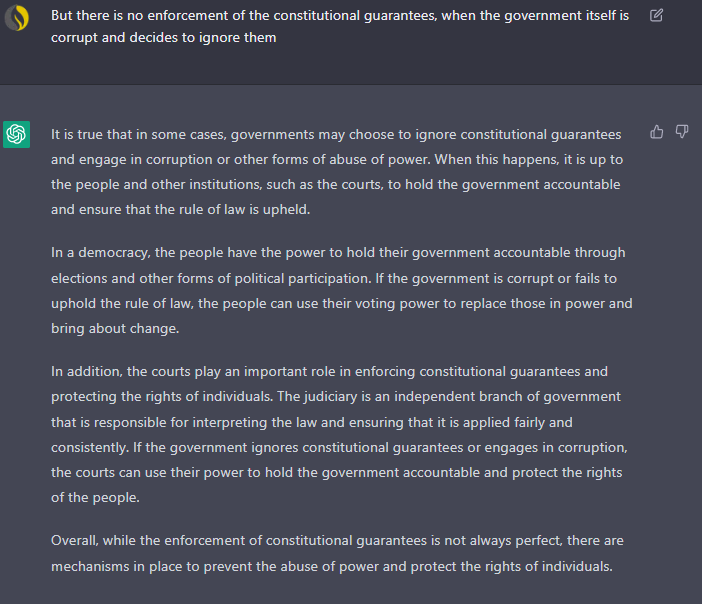I asked the AI what it thought about Tax Resistance.
I think it turned out to be a bit confused...
ChatGPT has taken the internet by storm.
OpenAI’s new chatbot program has taken the internet by storm, and it’s been a fascinating ride. Users have been having a hilariously fun time asking it anything from telling jokes, to creating backstories for Dungeons and Dragons characters, to ongoing political debates. Elon Musk even tweeted screenshots of the AI’s advice on how to improve twitter’s User Experience.
I was a bit skeptical at first, but decided to give the AI a shot, and started with a few innocuous questions to determine if it had a fair understanding of my political ideology.
I started by simply asking it to define the word “Liberty” and was surprised to get it mostly right.
I followed up with a request for information on why Libertarians should move to New Hampshire, and the Chatbot gave me a concise pitch that mirrors that of the Free State Project.
So I decided to get argumentative
once I was satisfied that the AI had enough of an understanding of libertarianism and my politics, I decided to try and push buttons to determine if there was any programmed bias. Now, this was not scientific, as I’m not a software engineer, and have no idea what goes into programming an AI. I just wanted to see how aggressive the AI would be in trying to refute my ideas.
I’ll spare you a long-winded soliloquy on the matter, and just let you read the discussion and come to your own conclusions. I found it mildly entertaining.
Taxation is theft
The statement "taxation is theft" is a common slogan among some libertarians and other proponents of limited government. The idea behind this statement is that when the government collects taxes from individuals or businesses, it is taking their money without their consent and against their will.
However, this view is not universally accepted, and many people argue that taxation is a necessary and legitimate function of government. Taxation is used to fund public goods and services, such as education, healthcare, and infrastructure, that benefit society as a whole. Without taxation, it would be difficult for the government to provide these services and meet the needs of its citizens.
It is also worth noting that taxation is not necessarily equivalent to theft in the legal sense. In most countries, taxation is a legal and constitutional requirement, and individuals and businesses are required to pay taxes according to established laws and regulations. While some people may disagree with the specific policies or levels of taxation in their country, taxation itself is not necessarily illegal or unethical.
Overall, the question of whether taxation is theft is a complex and contentious issue, and it is ultimately a matter of personal beliefs and values.
If I believe taxation is theft, am I justified in refusing to Pay taxes?
Whether or not you are justified in refusing to pay taxes if you believe that taxation is theft depends on the laws and regulations of the country you live in. In most countries, refusal to pay taxes is illegal, and individuals and businesses are required to pay taxes according to established laws and regulations.
If you believe that taxation is theft and you refuse to pay taxes, you may face legal consequences, such as fines or even imprisonment. In addition, your refusal to pay taxes may also have negative impacts on your community and society as a whole, as taxes are used to fund public goods and services that benefit everyone.
It is important to remember that if you disagree with the specific policies or levels of taxation in your country, there are legal and peaceful ways to express your views and try to bring about change. You can engage in political activism, vote in elections, and support political candidates who share your beliefs. Refusing to pay taxes without a legal basis is not a productive or effective way to make your voice heard.
but what if the law is unjust?
If you believe that a law is unjust, you have the right to challenge it and try to bring about change. In a democratic society, individuals and groups have the right to express their views and advocate for changes to laws and policies that they believe are unfair or harmful.
However, it is important to remember that the law is the foundation of a society, and it provides a framework for individuals and communities to live together and resolve disputes. Refusing to follow the law because you believe it is unjust can have serious consequences, and it may undermine the rule of law and create chaos and disorder.
If you believe that a law is unjust, the best course of action is to seek legal recourse and challenge the law through the courts or other legal means. This can be a slow and complex process, but it is the most effective way to bring about change in a fair and orderly manner. Refusing to follow the law without a legal basis is not a productive or effective way to make your voice heard.
I'm an anarchist
Anarchism is a political ideology that advocates for the abolition of government and the creation of a society based on voluntary cooperation and mutual aid. Anarchists believe that government is inherently oppressive and that individuals and communities are capable of self-governance and self-sufficiency.
As an anarchist, you likely believe in the importance of individual freedom and the power of voluntary association and cooperation. You may reject the idea of a central authority or governing body, and you may advocate for the creation of a society based on decentralized decision-making and voluntary cooperation.
It is important to remember, however, that anarchism is a complex and diverse ideology, and there are many different schools of thought within anarchism. Some anarchists may advocate for more violent or radical tactics to achieve their goals, while others may prioritize peaceful and nonviolent means. Ultimately, the specific beliefs and actions of an anarchist are determined by their individual beliefs and values.
So why should I follow laws I don't consent to?
As an anarchist, you may reject the idea of a central authority or governing body, and you may believe that individuals and communities are capable of self-governance and self-sufficiency. However, it is important to remember that in most societies, laws are the foundation of a stable and orderly society, and they provide a framework for individuals and communities to live together and resolve disputes.
While you may not personally consent to every law, it is important to remember that laws are created through a democratic process, and they reflect the collective will of the community. Even if you do not agree with a specific law, it is important to follow it unless and until it is changed through legal and peaceful means.
Refusing to follow the law without a legal basis can have serious consequences, and it may undermine the rule of law and create chaos and disorder. If you believe that a law is unjust, the best course of action is to seek legal recourse and challenge the law through the courts or other legal means. This can be a slow and complex process, but it is the most effective way to bring about change in a fair and orderly manner.
Democracy is simply the oppression of a minority by majority will
The statement "democracy is simply the oppression of a minority by majority will" is a criticism of democracy that is commonly made by those who believe that majority rule can lead to the abuse of power and the suppression of minority rights. This view is not universally accepted, and many people argue that democracy is the best form of government because it allows for the peaceful resolution of conflicts and the protection of individual rights.
It is true that in a democracy, the majority has the power to make decisions that affect the entire society, and this can sometimes result in the oppression of minority groups. However, it is important to remember that democracy also includes checks and balances to prevent the abuse of power and protect the rights of all individuals.
For example, in a democratic society, minority rights are often protected through constitutional guarantees and the rule of law. In addition, democracy allows for the peaceful resolution of conflicts through elections and other forms of political participation. Ultimately, the effectiveness of democracy in protecting minority rights depends on the specific laws and institutions of a given society.
But there is no enforcement of the constitutional guarantees when the government itself is corrupt and decides to ignore them
It is true that in some cases, governments may choose to ignore constitutional guarantees and engage in corruption or other forms of abuse of power. When this happens, it is up to the people and other institutions, such as the courts, to hold the government accountable and ensure that the rule of law is upheld.
In a democracy, the people have the power to hold their government accountable through elections and other forms of political participation. If the government is corrupt or fails to uphold the rule of law, the people can use their voting power to replace those in power and bring about change.
In addition, the courts play an important role in enforcing constitutional guarantees and protecting the rights of individuals. The judiciary is an independent branch of government that is responsible for interpreting the law and ensuring that it is applied fairly and consistently. If the government ignores constitutional guarantees or engages in corruption, the courts can use their power to hold the government accountable and protect the rights of the people.
Overall, while the enforcement of constitutional guarantees is not always perfect, there are mechanisms in place to prevent the abuse of power and protect the rights of individuals.
But the judges in the courts are appointed by corrupt politicians, and paid to enforce their rule, while the elections are rigged
It is true that in some cases, judges may be appointed by corrupt politicians, and elections may be rigged in order to maintain the power of those in control. When this happens, it can be difficult to hold the government accountable and ensure that the rule of law is upheld.
However, it is important to remember that not all judges are appointed by corrupt politicians, and not all elections are rigged. In many democracies, judges are appointed through a transparent and competitive process, and they are independent from the political branches of government. In addition, many elections are monitored by independent observers to ensure that they are fair and transparent.
If you believe that the judges in your country's courts are appointed by corrupt politicians, or if you believe that elections are rigged, it is important to engage in the political process and make your voice heard. You can support political candidates who share your beliefs, and you can participate in protests and other forms of political activism to bring about change.
Overall, while corruption and abuse of power are serious problems that need to be addressed, it is important to remember that there are mechanisms in place to prevent these issues and protect the rights of individuals.
what is the point of participating in a political system, if it is rigged to elect corrupt politicians trying to preserve power, and the judges are equally corrupt in protecting them?
Hmm...something seems to have gone wrong. Maybe try me again in a little bit.
We broke it I guess…
I’ll revisit the thread later, for my own interest. But I found it intriguing how the AI is able to admit and recognize the inherent corruption present in our current political system, and the overwhelming difficulty in reforming such a system in a rigged democracy, but still defaults to insisting that political involvement is the only option one has.
At one time in the past, I heard someone joke that if software engineers wrote all the laws, we would live in a Libertarian Dystopia, and I’m beginning to see how that contradiction may be close to the truth.
Live Free and Thrive!
My latest book is now available on Amazon in both Kindle and Paperback versions! It actually debuted as a #1 Bestseller in the relevant categories! Head on over to amazon today to grab your copy of Live Free and Thrive!: 101 Reasons that Liberty Lives in New Hampshire, and So Should You!
New Merch and Swag!
None other than show sponsor SnekSwag.com has a new full collection of official Subversive Swag where you can show off your rebel side by wearing your principles literally on your sleeves. Check out the collection today to grab your Swag now!
Join the Insurgency!
That’s right, You too can join the insurgency, and help support everything I’m doing here, from the podcast to the newsletter, to real-world activism and legislative lobbying work in New Hampshire.
Join us on Patreon, at Patreon.com/ODonnell for as little as $3 a month to help support the show financially and get some sweet perks as well!
You can also join our community Discord Channel to help grow the community around the show, and chat with other fans at any time! This requires participation, and it will be what we make of it, so join today and let’s grow it from the ground up together!
Copyright Justin O’Donnell, 2022
For Inquiries, contact, and booking: contact@anarchy.email
https://linktr.ee/subversivepod















